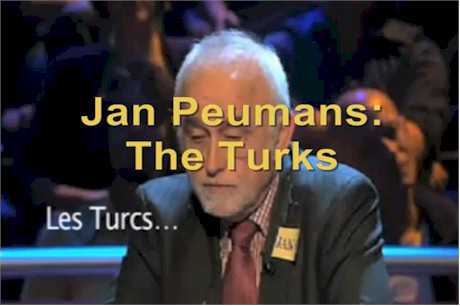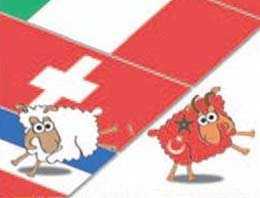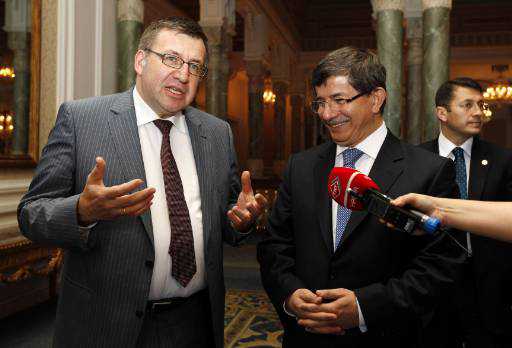Global Turkish reaction to a racist remark on live TV by a Belgian politician:
“Flanders’ Slanders”: How Would Voltaire React To them?
A leading lawmaker in Flanders deliberately insulted Turks and Turkey during a live TV program with unsolicited racist remarks. President of the Flemish parliament in Belgium, Jan Peter Peumans (59,) caused a global scandal with his arrogant and bigoted comments during a quiz show, ”De Pappenheimers,” by VRT (Flemish Public Radio and Television Broadcasting Federated) on Wednesday, December 1, 2010. (watch video: http://www.youtube.com/watch?v=aQFqcaqiJi0 )

The question the organizers of the quiz show haplessly considered amusing and proper for a competition watched by general public, including children, was related to a comment by the famous French philosopher, Voltaire: “Who did Voltaire think was the most disgusting nation?” The potential answers offered were a) Flemish, b) Jews, and c) Turks. Peumans replied: “ Turks.”
After a spontaneous laughter, he was reminded that the correct answer was “b) Jews”. Peumans said he knew the right answer but was scared to say it because of potential Jewish reaction. He said he had criticized the Jewish liberal policies once and had problems with strong Jewish protests. Laughter in the studio grew. When asked tongue-in-cheek “…And speaking ill about Turks is not a problem?” Peumans replied non chalantly with a negative. More laughter in the studio. All of this unfortunate episode took only a few minutes. But its reverberations sure promise to take a lot more than that.
Film director Jan Eelen, another contestant, told Peumans later that the Turkish Embassy had been informed of the incident by Güler Turan — a Flemish parliament member of Turkish heritage. Turkish Ambassador Murat Ersavcı did , indeed, call Peumans to convey Turkey’s disappointment by the racist question and comment. The remarks also drew strong reactions from Turks in and out of Belgium.
After the initial shock and disappointment over this unfortunate racism scandal on air were over, a more reasoned approach triggered the following thoughts:
First, it is, indeed, a sad day in Belgium if a major entertainment industry executive there thinks racist questions are fun for the entire family. A sensitization course in Belgium on issues of diversity and tolerance seems appropriate and urgent. Otherwise, I am afraid, we might be faced with “live roasting” of a Turk, literally, for more family fun on Belgian TV.
Second, it must be especially ironic for such a bigoted question to surface in a country which suffered terribly under the persecution by the German Nazis (perhaps Peumans is too young to remember or too ignorant to know.) Such a racist question should never have been asked or responded to in the first place. How would the audience, who cheered on so enthusiastically for the racist question and the equally racist response, respond if the next question in the live quiz show was about the feelings the German Nazis harbored: A) cowards B)cheap skates C) both? Would they consider that also to be “family fun?”
Third, if a Belgian politician publicly declares that he deliberately provides false answers for political expediency, and still cheered on by many in Belgium, what does that tell one about the attitudes and behaviors in Belgium, administrative capital of the European Union? Are prejudice, public humiliation, intimidation, discrimination, and racism accepted norms of thought and/or conduct in Europe?
Fourth, Voltaire was a campaigner against tyranny and bigotry, which is probably why he could not keep out of trouble. Voltaire, the Renaissance man of the Enlightenment, was no pussycat , either. He always struck back with bitter, mocking, poignant sarcasm whenever he was attacked. Voltaire often scrutinized the political and philosophical controversies of the 18th century and fought tirelessly for the oppressed.
Mr. Peumans—and others who support or defend him–urgently need to learn the tragic plight of Jean Calas, a Protestant merchant in Toulouse, France, which illustrates the principles of and passion in Voltaire.
Calas had a son who wanted to study law but he was denied access because he was not a Catholic. The son got very depressed and killed himself. Suicide was a grave sin then. His family decided to conceal the suicide as they did not want to see the son’s body dragged in the streets and fed to dogs as was the common practice to punish postmortem those committing suicide. A rumor started that Jean Calas murdered his son because the son had wanted to convert to Catholicism. The old man was convicted of murder on the basis of the flimsiest hearsay evidence by lynch mobs. Rejecting confession even after terrible torture, Calas was tied to a wooden cross, had his arms and legs were broken. Then Calas was strangled by the executioner and burned at the stake. The state confiscated Calas’ property, leaving his widow homeless, penniless, and childless, as the latter were forced into Catholic institutions.
Voltaire heard about this and set out to clear Calas. He wrote many letters to powerful people throughout Europe, hired a lawyer, and raised money for the family, eventually securing a unanimous vote in the parliament of Paris declaring Calas innocent. Reversal of his conviction meant that his estate was restored to his family and the children were returned to their mother. Now, that was Voltaire!
There are three reason why this story is important:
1) What ultra-right leaning Belgian politician and his supporters in Belgium (and other neo-Nazis in Europe) are doing to Turks today is not much different than what the Catholic Church in France did to Protestant merchant Jean Calas of Toulouse in 1762.
2) If Voltaire was alive today, he would probably fight the racist Belgian politician and his supporters for the same reasons why Voltaire fought for Jean Calas of Toulouse in 1760s.
3) Last but not least, Voltaire did comment on Turks and here is what he said:
“ The great Turk is governing in peace twenty nations from different religions. Turks have taught the Christians how to be moderate in peace and gentle in victory.”
It is never too late to learn a few new facts and some proper manners, Mr. Peumans.
And that goes for the rest of neo-Nazis in Belgium, Holland, France, Austria, and Germany where this scourge of humanity reared its ugly head again scoring a few victories in recent elections on a blatantly racist anti-Turkish platform, complete with a promise to keep Turkey out of EU.
Will neo-Nazis be allowed win while the rest of decent people look on silently?
Again?
[[petition-4]]
 The Turkish Embassy in Brussels has condemned a far-right party after it used posters depicting Turkish and Moroccan immigrants as a sheep being kicked out of Europe. The poster was presented at a conference of the anti-immigrant Flaman Vlaams Belang party over the weekend.
The Turkish Embassy in Brussels has condemned a far-right party after it used posters depicting Turkish and Moroccan immigrants as a sheep being kicked out of Europe. The poster was presented at a conference of the anti-immigrant Flaman Vlaams Belang party over the weekend.



